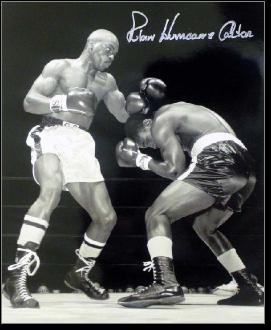
Sport: Boxing
Born: May 6, 1937
Died: April 20, 2014
Town: Paterson, New Jersey
Rubin “Hurricane” Carter was born May 6, 1937 in Paterson, NJ. He was sentenced to a juvenile reformatory called Jamesburg Home for Boys when he was 14 for assault and robbery. He escaped the reformatory in 1954 and joined the Army. Rubin was stationed in West Germany, where he began to box competitively. Rubin fashioned a 35-5 record in the service, winning the European Lightweight Championship.
As a soldier, Rubin enjoyed considerably less success. He was court-martialed four times, received a dishonorable discharge and was labeled as “undesirable.” Upon Rubin’s return to New Jersey, he was arrested for his earlier escape from Jamesburg and sent to prison for five months. Upon his release, Rubin committed a series of muggings, and was arrested for assault and robbery. He pled guilty in 1957 and spent four years in maximum-security facilities.
Rubin decided to become a professional boxer when he got out. Tipping the scales at 155-160 pounds and standing at 5’8″, he was shorter than the average middleweight. However, he had an aggressive style and incredible power behind his punches, earning him the nickname “Hurricane.” After launching his pro career in 1961, he beat contenders Florentuno Fernandez, Holley Mims, Gomeo Brennan, and George Benton, securing a spot in The Ring‘s Top 10 Middleweight Contenders in July 1963.
Rubin won four out of his six bouts in 1963 when, on December 20th, he surprised the boxing world by flooring former world champion Emile Griffith twice in the first round, and winning on a technical knockout. Rubin won two more fights in 1964 before his 15-round championship bout against world Middleweight title-holder Joey Giardello. He fought well in the early rounds but ultimately lost. He fought nine more times in 1965, losing to top contenders Luis Manuel Rodriguez, Dick Tiger, and Harry Scott.
Rubin’s boxing career was derailed by a homicide that took place at the Lafayette Bar and Grill in Paterson at about 2:30 A.M. On June 17, 1966, the bartender, James Oliver, and customer Fred Nauyoks, were killed instantly; another customer, Hazel Tanis, died about a month later from gunshot wounds to the throat, stomach, intestine, spleen, left lung, and arm. Customer Willie Marins survived a gunshot wound to the head but lost sight in one eye.
Eyewitnesses described a car matching Rubin’s; he had been in the area with his friend John Artis shortly after the time of the shooting. It was determined that the guns used by the two shooters were a .32 caliber pistol and a 12-gauge shotgun, and rounds and shells of each gun were found in Rubin’s car. Eyewitnesses from outside of the bar confirmed that Hurricane Carter and John Artis left the bar carrying weapons directly after the shooting.
At their 1967 trial, the two men were convicted, receiving two consecutive and one concurrent life sentences and three concurrent life sentences, respectively. However, in 1974 eyewitnesses from outside the bar recanted their identifications of Rubin and John, leading to a new trial. Hurricane Carter’s innocence campaign was led by George Lois. It gained him the support of Muhammad Ali and Bob Dylan, with Dylan later writing a song for him called “Hurricane.”
It was later confirmed by polygraph tests that the eyewitnesses did indeed identify Carter and Artis truthfully. Three of Rubin’s original alibi witnesses recanted to the prosecution, testifying that he had persuaded them to commit perjury and provide a false alibi. Rubin and Artis were found guilty once again, earning the same sentences as before. Artis was paroled in 1981.
In November 1985, Hurricane—now 50—was freed without bail after his lawyers petitioned to set aside his convictions because the prosecution appealed to “racism rather than reason, and concealment rather than disclosure.”
Hurricane Carter moved to Toronto. He served as the executive director of the Association in Defense of the Wrongly Convicted (AIDWC) from 1993 until 2005. He also works as a motivational speaker, and received two honorary Doctorates of Law from York and Griffith Universities for his work with AIDWC and the Innocence Project. Rubin received the Abolition Award from Death Penalty Focus in 1996.
Rubin’s boxing record was 27 wins with 19 knockouts—8 KO’s and 11 TKO’s—12 losses, and one draw in his 40 fights. In 1993, he received an honorary championship title belt from the World Boxing Council and was later inducted into the New Jersey Boxing Hall of Fame. His story inspired the 1999 film The Hurricane starring Denzel Washington.
Rubin passed away in the spring of 2014 from prostate cancer. In his final months, he worked to reopen the case of a Brooklyn man whose conviction he believed had many parallels to his own.